SEAT Leon SP Sportstourer VS Toyota Prius – Specs, Efficiency & Price Comparison
Which model is the better choice – the SEAT Leon SP Sportstourer or the Toyota Prius? We compare performance (272 HP vs 223 HP), boot capacity (620 L vs 284 L), efficiency (0.40 L vs 0.50 L), and of course, the price (25800 £ vs 39400 £).
Find out now which car fits your needs better!
The SEAT Leon SP Sportstourer (Estate) is powered by a Petrol, Petrol MHEV, Diesel or Plugin Hybrid engine and comes with a Manuel or Automatic transmission. In comparison, the Toyota Prius (Hatchback) features a Plugin Hybrid engine and a Automatic gearbox.
When it comes to boot capacity, the SEAT Leon SP Sportstourer offers 620 L, while the Toyota Prius provides 284 L – depending on what matters most to you. If you’re looking for more power, you’ll need to decide whether the 272 HP of the SEAT Leon SP Sportstourer or the 223 HP of the Toyota Prius suits your needs better.
There are also differences in efficiency: 0.40 L vs 0.50 L. In terms of price, the SEAT Leon SP Sportstourer starts at 25800 £, while the Toyota Prius is available from 39400 £.
Compare all the key specs now and find out which model fits your lifestyle best!
SEAT Leon SP Sportstourer
The SEAT Leon SP Sportstourer exudes a sleek and dynamic design, merging practicality with style effortlessly. Inside, the spacious and versatile interior ensures a comfortable ride for both driver and passengers, offering ample space for luggage and family needs. With its advanced technology and efficient performance, the Leon SP Kombi stands out as a superb choice for those seeking a reliable and modern family estate.
details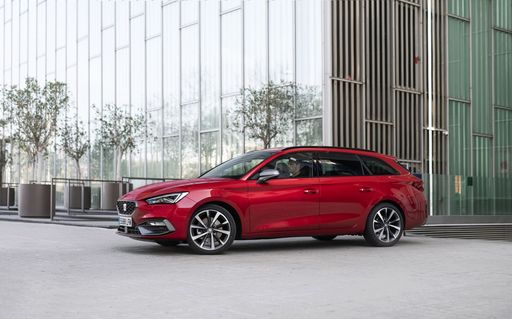 @ Seat
@ Seat
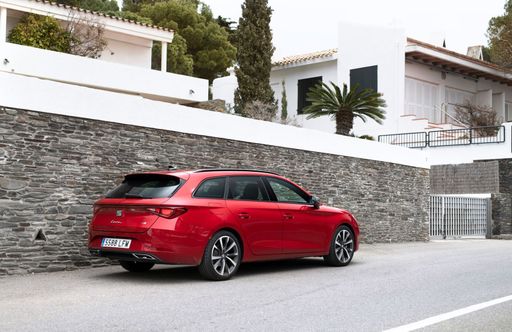 @ Seat
@ Seat
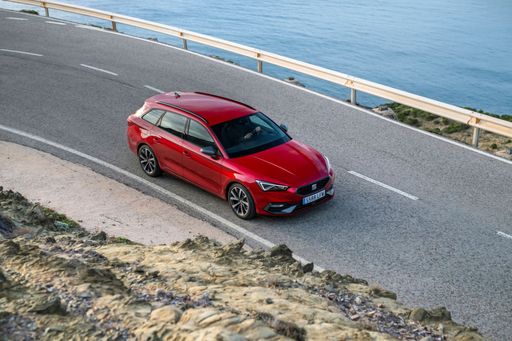 @ Seat
@ Seat
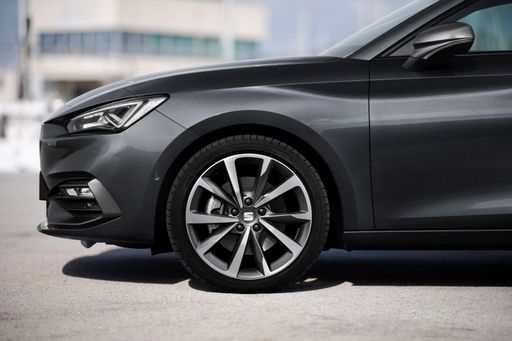 @ Seat
@ Seat
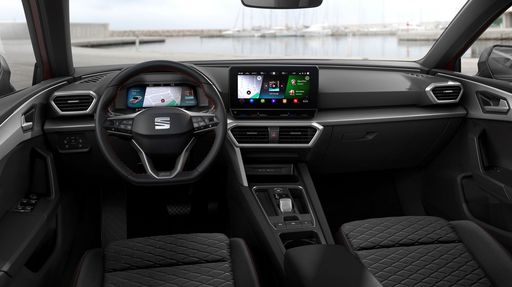 @ Seat
@ Seat
Toyota Prius
The Toyota Prius stands as a pioneer in the realm of hybrid vehicles, offering an eco-friendly driving alternative with its innovative technology. Its aerodynamic design and comfortable interior make it a practical choice for those looking to reduce their carbon footprint without sacrificing style. Additionally, the Prius boasts a reputation for reliability and efficiency, contributing to its lasting popularity among environmentally conscious drivers.
details @ Toyota
@ Toyota
 @ Toyota
@ Toyota
 @ Toyota
@ Toyota
 @ Toyota
@ Toyota

|

|
|
|
|
Costs and Consumption |
|
|---|---|
|
Price
25800 - 37000 £
|
Price
39400 - 45800 £
|
|
Consumption L/100km
0.4 - 5.7 L
|
Consumption L/100km
0.5 - 0.7 L
|
|
Consumption kWh/100km
-
|
Consumption kWh/100km
-
|
|
Electric Range
131 km
|
Electric Range
72 - 86 km
|
|
Battery Capacity
19.70 kWh
|
Battery Capacity
-
|
|
co2
9 - 130 g/km
|
co2
12 - 17 g/km
|
|
Fuel tank capacity
40 - 45 L
|
Fuel tank capacity
40 L
|
Dimensions and Body |
|
|---|---|
|
Body Type
Estate
|
Body Type
Hatchback
|
|
Seats
5
|
Seats
5
|
|
Doors
5
|
Doors
5
|
|
Curb weight
1384 - 1716 kg
|
Curb weight
1620 - 1630 kg
|
|
Trunk capacity
470 - 620 L
|
Trunk capacity
284 L
|
|
Length
4642 mm
|
Length
4599 mm
|
|
Width
1799 mm
|
Width
1782 mm
|
|
Height
1437 - 1456 mm
|
Height
1470 mm
|
|
Payload
414 - 569 kg
|
Payload
365 - 375 kg
|
Engine and Performance |
|
|---|---|
|
Engine Type
Petrol, Petrol MHEV, Diesel, Plugin Hybrid
|
Engine Type
Plugin Hybrid
|
|
Transmission
Manuel, Automatic
|
Transmission
Automatic
|
|
Transmission Detail
Schaltgetriebe, Automat. Schaltgetriebe (Doppelkupplung)
|
Transmission Detail
-
|
|
Drive Type
Front-Wheel Drive
|
Drive Type
Front-Wheel Drive
|
|
Power HP
110 - 272 HP
|
Power HP
223 HP
|
|
Acceleration 0-100km/h
7.9 - 10.8 s
|
Acceleration 0-100km/h
6.80 s
|
|
Max Speed
197 - 220 km/h
|
Max Speed
177 km/h
|
|
Torque
220 - 360 Nm
|
Torque
-
|
|
Number of Cylinders
3 - 4
|
Number of Cylinders
4
|
|
Power kW
85 - 200 kW
|
Power kW
164 kW
|
|
Engine capacity
1498 - 1968 cm3
|
Engine capacity
1998 cm3
|
General |
|
|---|---|
|
Model Year
2024 - 2025
|
Model Year
2023
|
|
CO2 Efficiency Class
D, B
|
CO2 Efficiency Class
B
|
|
Brand
SEAT
|
Brand
Toyota
|
SEAT Leon SP Sportstourer
The Versatility of the SEAT Leon Sportstourer
The SEAT Leon Sportstourer takes the well-loved Leon hatchback and extends its versatility with a spacious estate design. For families and adventurous individuals seeking both style and practicality, the Leon Kombi provides a compelling package. Let's explore the technical details and innovations that make this car a standout choice.
Powertrains That Cater to Every Need
Under the bonnet, the SEAT Leon Sportstourer offers a diverse range of engine options. Buyers can choose from efficient petrol engines, robust diesel options, mild hybrids, and even a plug-in hybrid variant. The power output ranges from 110 PS to an impressive 204 PS, ensuring there's a model for every driving style and need.
Efficiency Meets Performance
With a consumption rate as low as 1.1 L/100 km in the plug-in hybrid model and 5.8 L/100 km for conventional engines, the Leon Kombi scores high marks on efficiency. This is further supplemented by its CO2 emissions ranging from a mere 26 g/km to 130 g/km, aligning with modern sustainability demands without sacrificing performance.
Innovative Technology for the Modern Driver
Adorned with cutting-edge technology, the SEAT Leon Sportstourer makes driving a breeze. The Mild-Hybrid variants use a 48V electrical system, enhancing fuel efficiency and providing a smooth ride. The plug-in hybrid version boasts a 10.4 kWh battery, offering a purely electric range of 62 km—perfect for city commuting.
Attention to Comfort and Space
Designed as a family-friendly vehicle, the Leon Kombi does not compromise on comfort and space. It supports up to five passengers and offers a substantial boot capacity ranging from 470 to 620 litres, catering to all luggage needs, from daily errands to long family vacations. The interior, richly appointed with modern amenities, is a testament to SEAT's commitment to quality and driver satisfaction.
Safety Features That Instill Confidence
The SEAT Leon Sportstourer is well-equipped with advanced safety features. From adaptive cruise control to emergency assist systems, it ensures peace of mind for both driver and passengers. This focus on safety is a core part of what makes the Leon Kombi an attractive choice for families and frequent travellers.
Final Verdict
The SEAT Leon Sportstourer stands out as a top contender in the estate car segment. With a balanced blend of innovation, efficiency, and practicality, it assures comprehensive driving satisfaction. Its varied engine lineup, commitment to economy, and plethora of features make it a worthy investment for those seeking a versatile and reliable vehicle.
Toyota Prius
The All-New Toyota Prius: Revolutionising Efficiency and Performance
The Toyota Prius, a name synonymous with hybrid innovation, has once again shown why it remains at the forefront of eco-friendly automotive technology. The latest models have enhanced technical features and innovations, setting new standards for efficiency and driving experience.
Hybrid Performance: A Leap Forward
The latest Prius models employ a sophisticated 2.0 litre Plug-in Hybrid system that flawlessly melds petrol and electric power. With a power output of 223 PS, it propels the Prius with impressive dynamism, reaching 0-100 km/h in just 6.8 seconds. This performance-oriented aspect of the Prius does not compromise on efficiency, with an astonishing fuel consumption ranging from 0.5 to 0.7 L/100km.
Electric Range and Efficiency
One of the key highlights of the new Prius is its substantial electric-only range. Depending on the variant, it can travel between 72 to 86 km on electric power alone, making it an ideal choice for urban commutes where zero emissions are preferred. The hybrid system's CO2 emissions are remarkably low, between 12 and 17 g/km, contributing to its CO2 Efficiency Class B rating.
Engineering Excellence with CVT
The Prius is equipped with a state-of-the-art Continuously Variable Transmission (CVT), ensuring a smooth and efficient drive. This advanced transmission supports the front-wheel-drive layout, delivering power seamlessly and enhancing driving pleasure without sacrificing fuel economy.
Stylish Design and Comfort
Designed as a sleek five-door hatchback, the Prius offers a comfortable and spacious interior with seating for five passengers. It measures 4599 mm in length, 1782 mm in width, and 1470 mm in height, offering a practical balance of size and comfort. The boot space, while tailored for the hybrid battery, still provides a decent 284 litres of storage.
Cost Efficiency
The running costs of the Prius are competitive, with monthly expenses estimated between €1064 and €1188, and cost per kilometre ranging from 42.6 to 47.5 cents. Its efficient design results in a maximum speed of 177 km/h and a practical fuel tank size of 40 litres, ensuring less frequent stops on longer journeys.
Conclusion: The Prius Legacy Continues
The Toyota Prius continues to lead by example in the realm of hybrid technology. Combining impressive power with unmatched efficiency and a sophisticated driving experience, it is clear that the Prius remains a compelling choice for the environmentally conscious driver. Its innovative features and favourable cost metrics only bolster its appeal in the modern automotive landscape.
The prices and data displayed are estimates based on German list prices and may vary by country. This information is not legally binding.
